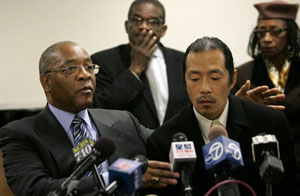
LOS ANGELES (FinalCall.com) – A column titled, “Why I Hate Blacks,” advocating discrimination and hatred, was published in the San Francisco-based AsianWeek newspaper Feb. 23, near the close of Black History Month. The piece sparked the usual outrage, apologies, terminations, dialogues and press conferences that routinely follow outbursts of bigotry. But beyond the question of accountability, time, again, presents a bigger challenge: What good can come out of this negative circumstance and what, concretely, can Blacks do about it?
At issue is Kenneth Eng, a science fiction writer, who began his diatribe by asserting that “we should discriminate against Blacks” because 1) Blacks hate Asians and make racist remarks against them; 2) Blacks are weak-willed and the only race that has been enslaved for 300 years; and, 3) Blacks are easy to coerce, and so on.
In its apology, dated Feb. 28, AsianWeek wrote, “Given that the genesis of the American civil rights movement was borne primarily by the African American community through blood and perseverance, the failing of our editorial process in allowing this opinion piece to go forward, was an insensitive and callous mistake that should never have been made by our publication.”
A litany of Asian American organizations followed AsianWeek’s suit and swiftly denounced Mr. Eng’s column, calling it unacceptable and offensive. Condemnation also fell on the weekly journal as well, with critics, including, according to SFGate.com, Keith Kamisugi of the Equal Justice Society and others demanding that the editors who cleared the column also be held accountable, and AsianWeek counter the column in print and review its processes.
Min. Christopher Muhammad, the San Francisco representative of the Hon. Min. Louis Farrakhan, stated that there will be times when people will misspeak and say things that are not necessarily appropriate; however, he cautioned, “We cannot allow the Black community to be pitted against our Chinese Brothers and Sisters, no more than we can allow the Black community to be pitted against Latino Brothers and Sisters. We have to be very mindful that the enemy of us all does not want to see the Black man in America having friendships with his family throughout the earth.”
Min. Muhammad said that these communities must be mindful that they are natural allies of each other, and that their natural enemy delights when he can produce a wedge between them. “It would be wise for Black leaders, leaders in the Chinese community, Latino community, wiser heads, as the Hon. Min. Louis Farrakhan has encouraged, come together, sit down and not get bent out of shape over comments, but how can we look past these comments and see where we have common ground to begin to build, as China is now working to engage in Africa. We have a role to play in that,” he added.
Atty. Barbara Ratliff, one of many at the forefront of the Reparations Movement, commented, “In spite of unmatched success by many descendants of Black African slaves in every discipline, a young, college educated Asian man could make these ignorant generalizations about Blacks.” Atty. Ratliff insisted that Mr. Eng’s statements are evidence for the mandatory education about Blacks by all ethnic groups and the pattern or habit of racism.
She discussed the link between Blacks and Asians on a day-to-day basis, stating, “Black women spend millions of dollars on hair for braiding and weaves in stores owned by Asians and few, if any, Blacks work in the stores. I understand that Eng was fired and the publisher apologized. That is not sufficient,” she continued. She offered that the AsianWeek sponsor a teach-in, T.V. show, or run advertisements about Black history in its or other newspapers.
Min. Muhammad, who encouraged constructive engagement, not boycotting, opined that Blacks, in their state of underdevelopment, are exploited by everybody, including themselves, because of a lack of development. He stated, “We have not followed the guidance of the Hon. Elijah Muhammad and the Hon. Min. Louis Farrakhan, so, people, when they come to this country, do not have a proper view of us.” He noted that in San Francisco, the Nation of Islam (NOI) has a good relationship with the Chinese community, and that the NOI’s work of cleaning up and dignifying its people is so critical, because it gives people of the world another view of Black people.
Dr. Rosie Milligan, owner of Milligan Books, a Los Angeles-based self-publishing company, said that Blacks must give power to how they see each other, and not to how others perceive them. “Perception doesn’t validate truth. He represents hundreds of people who feel the same way, but have nothing to do with what we do with our journey. Having him fired will not change our plight,” she stated.
Dr. Milligan said that the definite trade imbalance of Blacks buying from everybody with nobody buying from them can be reversed with strategic planning, rather than boycotting. She further stated that it has been long overdue for Blacks to probe strategic economic measures, but not simply because of an ignorant statement.
“It’s not the external that’s killing us. It’s the internal. We’re steady fighting about I’m Baptist. You’re not. I’m Democrat. You’re not, and through it all, we’re becoming a disappearing act. Even if we start talking about boycotting, they know that within three days, we’ll be right back there, because we produce none of the products that we need for ourselves,” she said.
–30–












